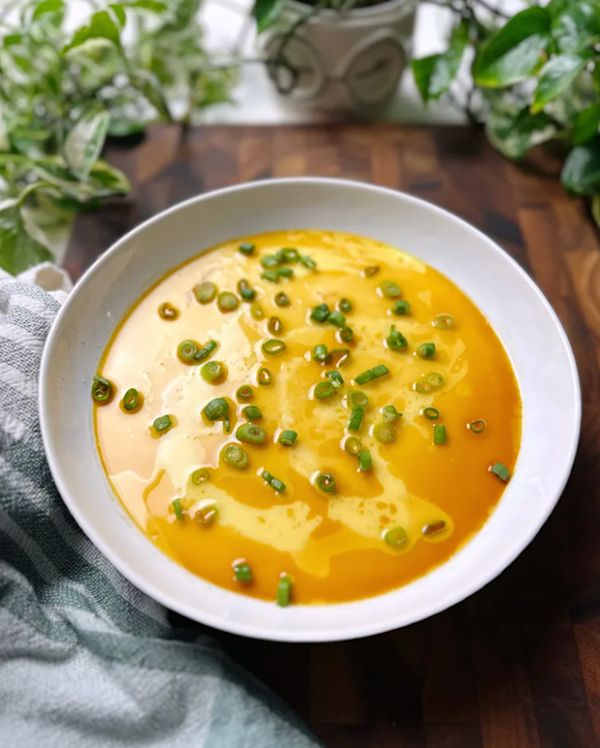steamed eggs
ingredients
3 large eggs
2:1 ratio warm water to eggs (or low-sodium chicken broth)
¼ teaspoon salt
½ teaspoon chicken bouillon powder (skip if using chicken broth)
toppings
1 teaspoon sesame oil
1 teaspoon soy sauce
white pepper
chili oil (optional)
steps
Prepare the egg mixture
Place a large cup or bowl on a kitchen scale, set the unit to fluid oz, and crack the eggs into the cup. Add a 2:1 ratio of warm water to eggs. For example, if the eggs weighed 5 fluid oz in total, you’ll add 10 fluid oz of warm water.
3 large eggs, 2:1 ratio warm water to eggs
Season with salt and chicken bouillon powder (skip if using chicken broth). Beat thoroughly.
¼ teaspoon salt, ½ teaspoon chicken bouillon powder
Steam the eggs
Bring a pan of water (at least 2-3 inches high) to a boil. Lower to medium heat.
Set up your steamer, and place a bowl or plate in the middle. Strain the egg mixture onto the plate. With a spoon, remove all the foam and bubbles on the surface.
Cover the eggs with an upside down plate. Put the lid on the pan, and steam for 8 mins (time may vary slightly based on what plate you’re using. I.e. if you use an aluminum plate vs a porcelain or ceramic plate (what I'm using), you may want to reduce the cook time by 1 min or so, since aluminum conducts heat quicker.). After 8 mins, turn off the heat but keep the lid on. Let the residual heat continue cooking for 5 mins.
Carefully remove from the pan, then top with sesame oil, soy sauce, white pepper, and scallions. Enjoy!
Tip #1: Use a kitchen scale to measure a 2:1 ratio for the weight of liquid to eggs
Because individual eggs vary in weight (in different parts of the world, and even within the same carton), using a kitchen scale helps you consistently achieve the same ratio and results every single time. If you don’t have one, you can use a liquid measuring cup instead to measure by volume.
Tip #2: Strain the eggs through a sieve, then remove all the foam and bubbles on the surface
This step takes some time, but is crucial if you want the smoothest texture and appearance!
Tip #3: Cover the eggs and steam gently on medium heat
Some people use plastic wrap to cover the eggs, which works, but for a more eco-friendly solution, an upside-down plate works great. The cover here prevents condensation dripping onto the egg surface.
Steaming on medium heat is key for a smooth texture and even cook, as high heat may cook the outside quicker and create air pockets.
Remember that everyone’s stove, steamer, and tools (like your plate) may vary slightly, so I recommend using this as a guide, then fine tuning it based on your setup! Good luck, and feel free to comment with any questions you have!
